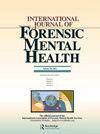Exploring Cognitive Functioning among Forensic Mental Health Inpatients
IF 0.9
4区 医学
Q3 CRIMINOLOGY & PENOLOGY
International Journal of Forensic Mental Health
Pub Date : 2023-11-03
DOI:10.1080/14999013.2023.2276964
引用次数: 0
Abstract
AbstractA large proportion of forensic mental health (FMH) inpatients experience cognitive impairments, which may impact the extent to which they benefit from interventions aimed at reducing their risk of recidivism. These impairments should be identified and responded to as quickly and accurately as possible. The current study explored when and how FMH inpatients’ cognition is assessed during their stay at a forensic hospital, with a cognitive profile being constructed of the sample. The medical files of inpatients who resided at the hospital in Melbourne (Australia) during January 2016 and December 2019 were reviewed retrospectively. A total of 99 medical files were identified. The type, timing and results of each cognitive assessment were collected. Frequency analysis revealed more than half of the sample received a cognitive assessment, with most of the cognitive assessments being conducted within the first year of an inpatient’s admission to hospital. Between 19% and 31% of inpatients with available cognitive data demonstrated a global cognitive impairment, depending on the cognitive measure being used. These results highlight the value of assessing FMH inpatients for cognitive impairments to respond to them appropriately to increase their chances of rehabilitation. Careful consideration should be given to the type of cognitive assessment tool used among this demographic.Keywords: Neuropsychologycognitive assessmentsforensic inpatientsforensic psychiatric hospitalcognitive dysfunctionclinical practice AcknowledgementsThe authors would like to acknowledge Dr Stuart Lee and thank him for the contributions he made to this study.Conflict of interestThe authors have no conflicts of interest to report.Notes1 Inpatients admitted under a Custodial Supervision Order receive compulsory mental health treatment whilst under forensic care.2 A brief cognitive assessment was operationalised as the use of a cognitive screening tool (e.g., RBANS, WASI, Neuropsychiatric Unit Cognitive Screening Tool [NUCOG; Walterfang et al., Citation2003], Mini Mental State Exam [MMSE; Folstein, Folstein, & McHugh, Citation1975]) or a standalone measure (e.g., WAIS, Card Sorting Test, etc.)3 A more comprehensive cognitive assessment was operationalised as the use of two or more cognitive measures (e.g., WAIS and WMS).4 Some of these measures included cognitive assessment batteries (e.g., WAIS, WMS), as well as subtests of larger cognitive assessment batteries that were used as stand-alone measures (e.g., using only the Stroop test or TMT from the DKEFS battery).Additional informationFundingThis work was supported by an Australian Government Research Training Program Scholarship (H.C.), and Senior National and Medical Research Council (NHMRC) Fellowship (S.R., GNT1154651).法医精神科住院病人认知功能的探讨
很大一部分法医心理健康(FMH)住院患者经历认知障碍,这可能会影响他们从旨在降低其再犯风险的干预措施中获益的程度。这些缺陷应该被识别出来,并尽可能快速准确地做出反应。目前的研究探讨了何时以及如何评估FMH住院患者在法医医院住院期间的认知,并构建了样本的认知概况。回顾性回顾2016年1月至2019年12月在澳大利亚墨尔本该医院住院患者的医疗档案。共查明99份医疗档案。收集每次认知评估的类型、时间和结果。频率分析显示,一半以上的样本接受了认知评估,大多数认知评估是在住院患者入院的第一年进行的。根据所使用的认知测量方法,有现有认知数据的住院患者中有19%至31%表现出全面认知障碍。这些结果突出了评估FMH住院患者认知障碍的价值,以适当地对他们做出反应,以增加他们康复的机会。应该仔细考虑在这一人群中使用的认知评估工具的类型。关键词:神经心理学认知评估法医住院患者法医精神病院认知功能障碍临床实践致谢作者要感谢Stuart Lee博士对本研究的贡献。利益冲突作者无利益冲突需要报告。注1根据羁留监管令入院的病人在接受法医护理的同时,须接受强制性精神健康治疗使用认知筛查工具(如RBANS, WASI,神经精神科认知筛查工具[NUCOG;Walterfang等,Citation2003],迷你精神状态测试[MMSE;Folstein, Folstein, & McHugh, Citation1975])或一个独立的测量(例如,WAIS,卡片分类测试等)3更全面的认知评估被操作为使用两个或更多的认知测量(例如,WAIS和WMS)其中一些测量包括认知评估测试(例如,WAIS, WMS),以及用作独立测量的较大认知评估测试的子测试(例如,仅使用Stroop测试或DKEFS测试中的TMT)。本研究得到了澳大利亚政府研究培训计划奖学金(H.C.)和高级国家和医学研究委员会奖学金(s.r., GNT1154651)的支持。
本文章由计算机程序翻译,如有差异,请以英文原文为准。
求助全文
约1分钟内获得全文
求助全文

 求助内容:
求助内容: 应助结果提醒方式:
应助结果提醒方式:


